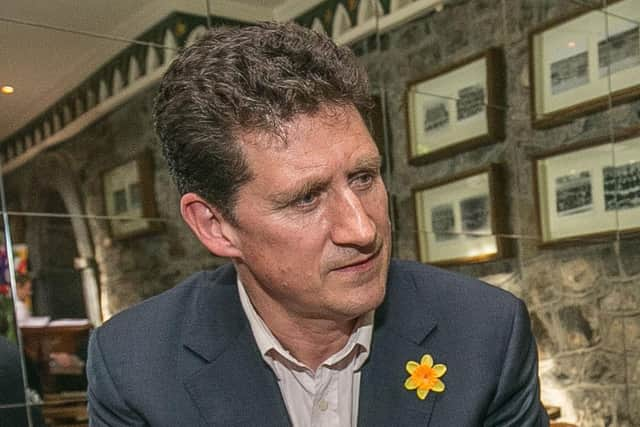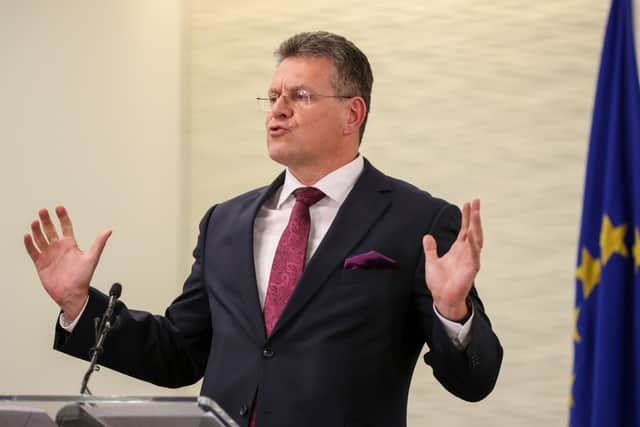NI Protocol: Dublin called out over ‘hypocrisy’ of its new cross border customs checks
and live on Freeview channel 276
And Unionists say Dublin’s plans for checks on some goods entering from NI give a lie to previous claims such a move would reignite terror attacks and threaten the Good Friday Agreement.
The claims come after Dublin announced it is to start blocking a range of fuels crossing the border into the Republic as part of a drive to enforce new air quality rules in 2022. Some 1,300 people reportedly die every year in the Republic because of air pollution linked to burning wood, coal and peat.
Advertisement
Hide AdAdvertisement
Hide AdIrish Environment Minister Eamon Ryan said: “Given the links between burning of solid fuels and the health effects of air pollution, as well as the potential for market distortion for businesses properly adhering to the regulations, increased multi-agency enforcement and inspections of cross-border fuel movements will be required.”


Under the new rules, The Times reported, coal-based products, manufactured solid fuel and peat briquettes will be required to have a smoke emission rating of less than 10g an hour and wood will be required to have a moisture content of 25 per cent or less.
MORE NEWS:
Advertisement
Hide AdAdvertisement
Hide Ad

But TUV leader Jim Allister said the announcement underscores “the farce” of the Dublin and EU position throughout the entire Brexit process.
During post-Brexit debates, Irish ministers vociferously protested against proposals for the post-Brexit EU customs border being placed on the border between the Republic and NI; such a move, they said, would mean introducing customs posts which would be provoke fresh terror attacks and threaten the Good Friday Agreement.
“But for all the claims that any requirement on the EU to police its own border would be tantamount to the end of the Belfast Agreement, they know fine well that this is not the case,” Mr Allister said.
The development comes after the latest NI Protocol talks between the UK’s Lord Frost and EU’s Maros Sefcovic (pictured) appeared to end on a more positive note.
Advertisement
Hide AdAdvertisement
Hide AdMr Allister continued: “What’s more, as we saw with vaccines, the EU is prepared to impose a ‘hard border’ if and when they believe doing so coincides with its own narrow interests. Now we find that the Republic is introducing checks to stop solid fuel coming in from Northern Ireland. Peace and stability does not, it appears, depend on there being no border checks after all. The hypocrisy is sickening.”
DUP MLA Gary Middleton came to a similar conclusion about the apparent inconsistency of the new Irish government position.
“The irony won’t be lost on many people that it appears quite possible for Dublin to support a border on the island of Ireland when they choose to,” he said.
“Perhaps Eamon Ryan might want to share this revelation with the rest of his colleagues in the Irish Government, who told us this was impossible.”
Advertisement
Hide AdAdvertisement
Hide AdHowever a spokesman for the Irish Department of the Environment insisted that while the checks on fuel coming in from NI would take place, the goods would be inspected by local authorities after arrival in their various jurisdictions - and not on the actual border.
“The Department has no plans to institute any border checks,” he said. “In the context of the new regulations being developed for solid fuels, where the new technical standards will be established, all imports of solid fuels will be subject to the appropriate checks to ensure they meet the required standards – irrespective of the country of origin.
“Local Authorities will be responsible for enforcing the provisions of the new enhanced solid fuel regulations within their functional areas and will have significant powers available to enable them to do so effectively.”
The plan has echoes of the “trusted trader scheme” between Norway and Sweden, which Dr Lars Karlsson, a former director of Swedish customs, suggested to MPs in 2018 could be a solution to concerns of a ‘hard’ customs border on the island of Ireland.
Advertisement
Hide AdAdvertisement
Hide AdThe Irish government, however, had rebuffed the proposals in a letter to The Times newspaper, saying that the ideas put forward in his report would not be enough to prevent a hard border after Brexit.
Meanwhile, after the latest talks with the EU yesterday, the UK government said that “significant gaps” remain to be bridged over the NI Protocol, and that Article 16 - which can suspend problematic parts of the deal - remains a legitimate part of the agreement.
A UK Government spokesperson said: “Lord Frost and EU Commission Vice-President Sefcovic met today in London to consider the state of play in discussions on the Northern Ireland Protocol.
“Lord Frost noted that there remained significant gaps to be bridged between the UK and EU positions. He noted that, as set out to the House of Lords on November 10, it remained the UK’s preference to find a consensual way forward, but that Article 16 safeguards were a legitimate part of the protocol’s provisions.
Advertisement
Hide AdAdvertisement
Hide Ad“Lord Frost also underlined the need to address the full range of issues the UK had identified in the course of discussions, if a comprehensive and durable solution was to be found that supported the Belfast (Good Friday) Agreement and was in the best interests of Northern Ireland.”
However European Commission vice-president Maros Sefcovic said there had been a “change in tone” from Lord Frost in the latest talks. Mr Sefcovic said: “I acknowledge and welcome the change in tone of discussion with David Frost today, and I hope this will lead to tangible results for the people in Northern Ireland.”
He told reporters the UK needed to “reciprocate the big move the EU has made” on the Northern Ireland Protocol. However he said that “definitely nothing’s changed” in the EU’s position over UK concerns about the European Court of Justice retaining jurisdiction over Northern Ireland in relation to the issues.
Reacting to the news, DUP leader Sir Jeffrey Donaldson urged more focus in talks.
Advertisement
Hide AdAdvertisement
Hide Ad“Whilst I welcome the more positive tone from the EU today, we really do need to see a sharper focus now on finding a solution that deals with the problems that have been created by this entirely unacceptable Irish Sea border,” he said. The Government has made clear, he said, that conditions have been met to trigger Article 16, and for the UK to take unilateral action to address the difficulties it creates, he said.
But Sinn Fein President Mary Lou McDonald said outstanding issues around the Northern Ireland Protocol “could be overcome if the British Government worked in partnership with the EU”,
Speaking yesterday, Ms McDonald called for “less brinkmanship, less of the bad faith and the belligerence from the British Government”.
She said: “We need them to work in partnership with the European institutions. I have to say that our analysis is that the difficulty has come from the British Government, who regard Ireland, and the north of Ireland in particular, as collateral damage in their Brexit game. That is not good enough.”
MORE NEWS
Advertisement
Hide AdAdvertisement
Hide AdAdvertisement
Hide AdAdvertisement
Hide AdA message from the Editor:
Thank you for reading this story on our website. While I have your attention, I also have an important request to make of you.
With the coronavirus lockdown having a major impact on many of our advertisers - and consequently the revenue we receive - we are more reliant than ever on you taking out a digital subscription.
Advertisement
Hide AdAdvertisement
Hide AdSubscribe to newsletter.co.uk and enjoy unlimited access to the best Northern Ireland and UK news and information online and on our app. With a digital subscription, you can read more than 5 articles, see fewer ads, enjoy faster load times, and get access to exclusive newsletters and content. Visit https://www.newsletter.co.uk/subscriptions now to sign up.
Our journalism costs money and we rely on advertising, print and digital revenues to help to support them. By supporting us, we are able to support you in providing trusted, fact-checked content for this website.
Ben Lowry
Editor